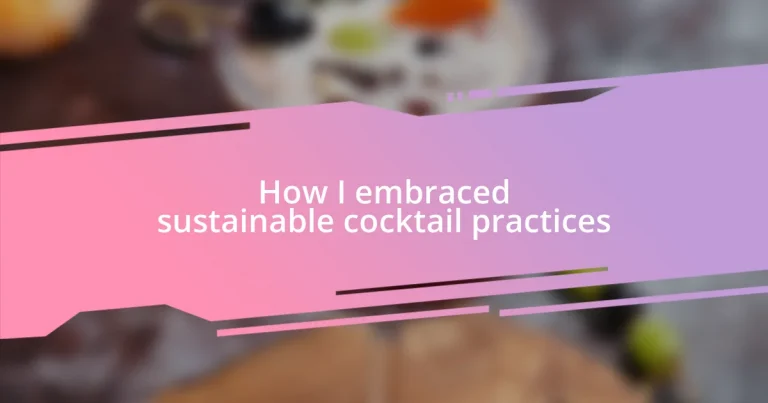Key takeaways:
- Emphasizing sustainable practices in mixology enhances creativity, flavor, and environmental responsibility, transforming cocktails into meaningful experiences.
- Sourcing local and organic ingredients leads to fresher flavors, supports local economies, and fosters community connections, enriching the cocktail-making process.
- Reducing waste by creatively repurposing leftovers and using eco-friendly bar tools not only minimizes environmental impact but also inspires new and exciting drink offerings.
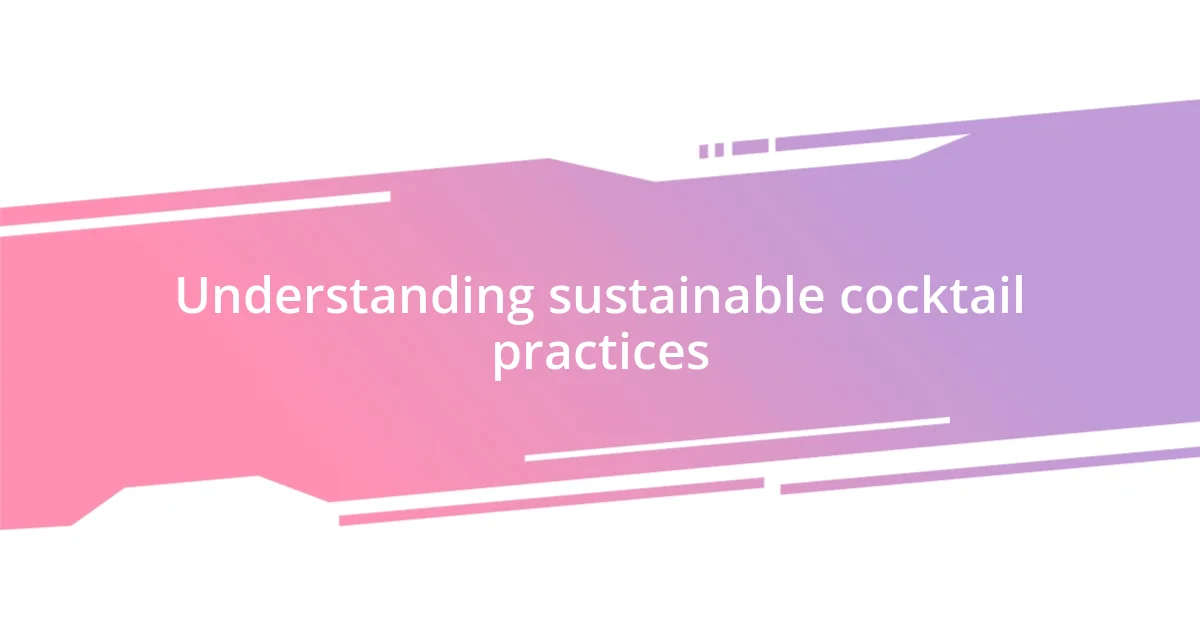
Understanding sustainable cocktail practices
Sustainable cocktail practices begin with a deep respect for both ingredients and the environment. I vividly remember a bartender friend sharing a story of cultivating herbs in his backyard, which transformed not just the cocktails he served, but also connected him more to his craft. Have you ever thought about how much more meaningful a drink becomes when you know its ingredients are local and fresh?
One essential aspect of these practices is minimizing waste. For instance, I’ve started using fruit peels and cores to make syrups or garnishes rather than tossing them out. It’s astonishing how these seemingly mundane parts can contribute rich flavors and vibrant colors. Wouldn’t you agree it’s rewarding to repurpose what would typically be discarded?
Additionally, selecting organic and ethically sourced spirits can lead to a more sustainable bar experience. I recall a night where I tried a local organic vodka that not only tasted exceptional but also supported small farmers. This experience made me wonder: how many times do we choose convenience over quality, and what impact does that have on our planet? Embracing these practices isn’t just about sipping; it’s a journey towards conscientious enjoyment.
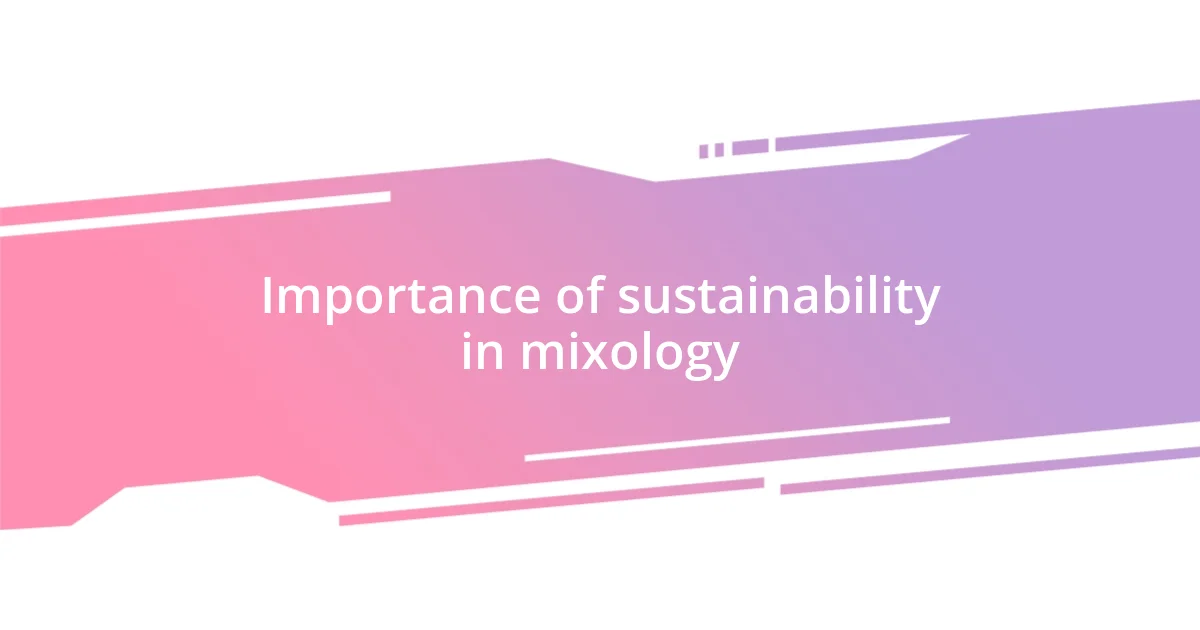
Importance of sustainability in mixology
Sustainability in mixology is vital not just for the environment but also for innovation in crafting drinks. I remember an event where the focus was on “trash cocktails,” where ingredients usually tossed aside were the stars. The creativity that emerged from these constraints was mind-blowing. I didn’t just enjoy the drinks; I felt a part of something bigger— a movement towards change in our bar culture. Can you imagine the excitement in transforming what was previously dismissed into a delightful experience?
Another important aspect is enhancing flavor profiles while supporting local economies. When I shifted to using seasonal fruits from nearby farms, the cocktails had a vibrant freshness that mass-produced ingredients simply couldn’t match. Feeling that connection to the land made every sip more enjoyable. Isn’t it fascinating how sustainable choices can significantly elevate the quality of what we consume?
Ultimately, sustainability fosters a sense of responsibility. I often think about the legacy we leave through our choices as bartenders and consumers. By advocating for sustainable practices, we’re not just creating better cocktails; we’re promoting a healthier planet. This insight truly motivates me to keep pushing the boundaries of mixology.
| Aspect | Importance |
|---|---|
| Minimizing Waste | Reduces environmental impact while encouraging creativity. |
| Supporting Local | Enhances flavor and fosters economic growth in local communities. |
| Ethical Choices | Encourages responsibility and sustainability in the industry. |
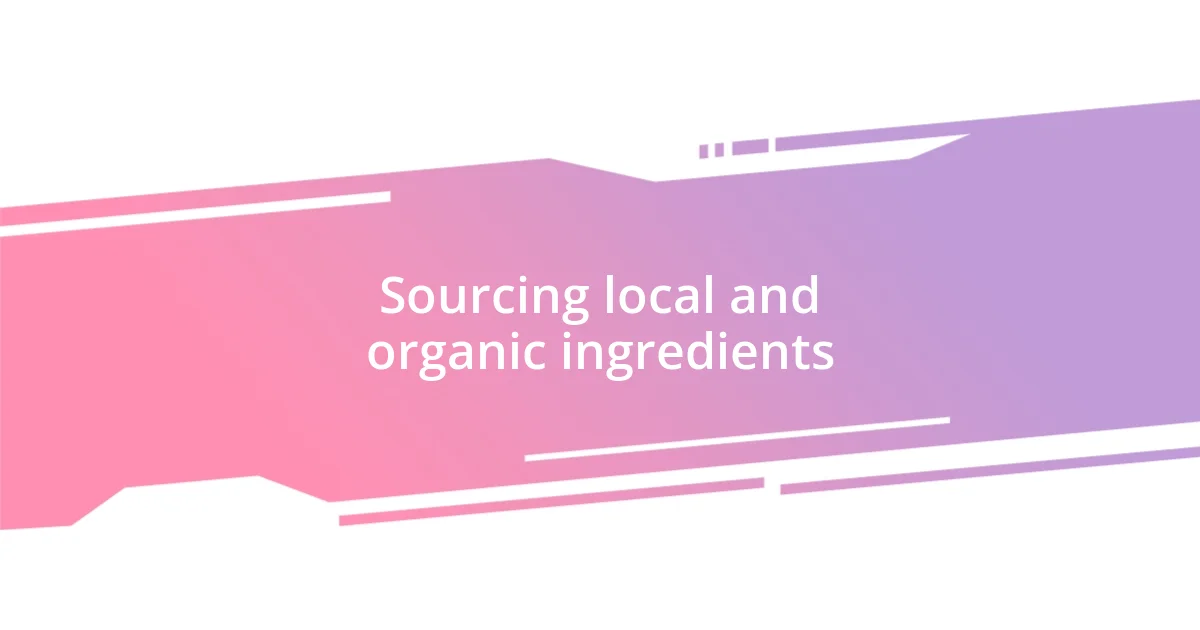
Sourcing local and organic ingredients
Sourcing local and organic ingredients has truly transformed the way I approach cocktail creation. One sunny Saturday, I visited a nearby farmers’ market and chatted with a farmer about their heirloom tomatoes. I left with not just tomatoes but a sense of pride, knowing I was supporting someone who cultivates their produce with love and care. Using these vibrant, local ingredients in my drinks has added a layer of authenticity that I never experienced before—every cocktail carries a story now.
When I think about sourcing, I focus on the following key benefits:
- Freshness and Flavor: Local ingredients are often picked at their peak, resulting in a brighter, more intense flavor.
- Seasonality: Embracing what’s in season not only supports a balanced ecosystem but also allows for creativity in crafting unique cocktails.
- Community Impact: Supporting local farmers strengthens our economy and fosters a sense of community, making each drink more meaningful.
- Transparency: Knowing where my ingredients come from gives me confidence in their quality and sustainability.
In my experience, these elements combine to create an enriching cocktail-making journey that resonates well beyond the glass.
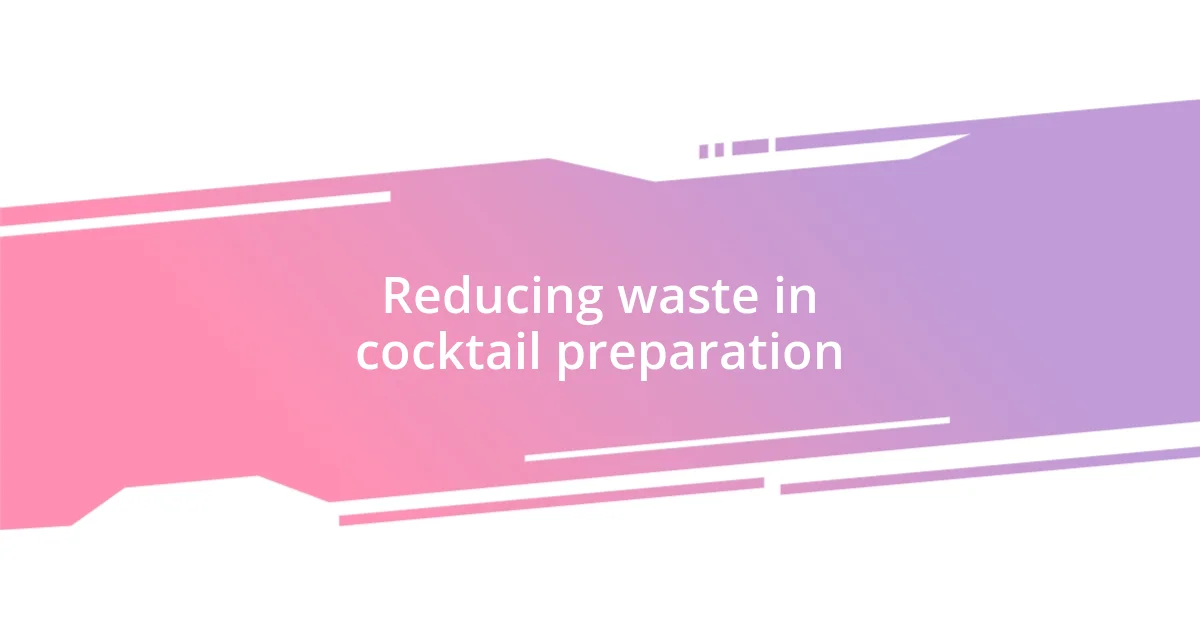
Reducing waste in cocktail preparation
Reducing waste in cocktail preparation is something I’ve become quite passionate about. One practice I’ve embraced is using every part of the fruit or herb I work with. For instance, when juicing lemons, I save the peels to create aromatic syrups or even a zesty salt for rimming glasses. Have you ever tried a cocktail that hinted at citrus without the actual juice? It adds a depth of flavor you might not expect, transforming what would be waste into something wonderful.
I also learned early on that having a designated “scrap bowl” for unused ingredients can streamline my process. During busy nights, instead of tossing herbs and citrus leftovers, I toss them in this bowl to create a flavorful infusion for my next cocktail. Just last week, I used some leftover basil and watermelon rinds to craft a refreshing summer drink. The unintended creations often become the guests’ favorites! Isn’t it amazing how every discarded bit can inspire a new cocktail?
Moreover, I’ve started to implement a “no waste” challenge at my bar, where we experiment throughout the week to utilize as much leftover product as possible. It not only brings the team together creatively but also surprises our regulars with unique offerings. This shift has made me more aware of what I can repurpose in my cocktails. Have you tried reducing waste in your drink-making? The rewards can be delicious and eye-opening!

Eco-friendly bar tools and equipment
When it comes to eco-friendly bar tools, I’ve found that opting for sustainable materials is a game changer. For example, I replaced my traditional plastic straws with reusable metal ones, and I must admit, they add a sleek touch to my cocktails too! Have you ever thought about the impact of a simple tool like that? It feels good to know I’m contributing less plastic waste, while enhancing the drinking experience for my guests.
Another significant shift I’ve made is using glass cocktail shakers instead of shiny, mass-produced metal ones. The first time I used a vintage glass piece, I was struck by the way it felt in my hands—it wasn’t just a tool; it was a conversation starter. Guests would often ask about its history, allowing me to share how it aligns with my commitment to sustainability and unique cocktail crafting. Isn’t it refreshing to think how the tools we choose can spark a dialogue that goes beyond just drinks?
Additionally, I’ve discovered biodegradable bar mats crafted from natural materials that absorb spills just as well as their synthetic counterparts. Transitioning to these products not only visually elevates my bar setup but also aligns with my values. Knowing every wipe-down contributes to a healthier planet just adds to the satisfaction of my craft. Have you experienced the joy of transforming your space into an eco-friendly haven? It certainly brings a deeper sense of purpose to each pour!
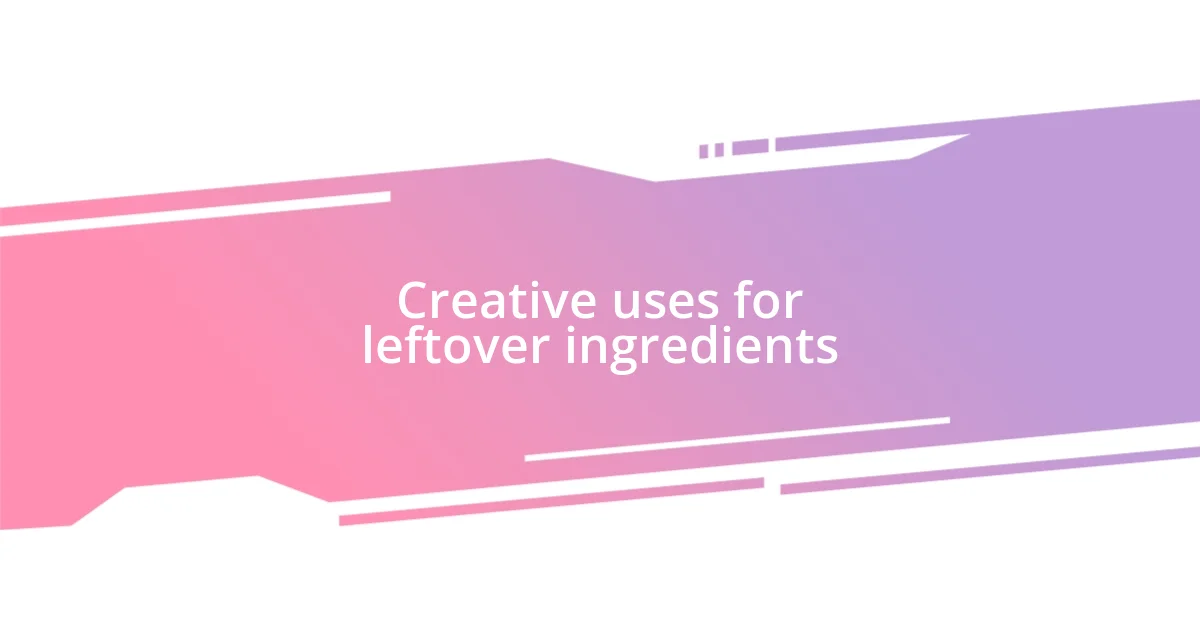
Creative uses for leftover ingredients
One of my favorite ways to use leftover ingredients is by crafting my own bitters from citrus peels and spices. Recently, I gathered some leftover orange peels and mixed them with crushed juniper berries, letting them steep in high-proof alcohol for a couple of weeks. The result? A uniquely flavored bitters that added depth to my cocktails, and I couldn’t help but think how fascinating it is that something destined for the trash can transformed into a signature addition to my drinks. Have you ever considered making your own bitters? It not only reduces waste, but it also allows you to personalize flavors in a way that mass-produced options can’t match.
Last weekend, I had an abundance of bruised berries that were past their prime. Instead of tossing them, I decided to whip up a berry shrub, which is essentially a vinegary syrup. I combined the berries with vinegar and sugar, letting it sit for a few days. The end result was a tart, refreshing mixer that paired beautifully with gin. My guests loved it, and I reveled in the fact that I turned potential waste into a flavorful highlight of the evening. It’s moments like these that remind me how creativity can thrive in the face of leftovers.
Another technique I’ve embraced involves using spent tea leaves and coffee grounds from my morning routine. I’ve experimented with infusing spirits using the leftover leaves, resulting in unique flavors that pleasantly surprise my patrons. Have you tried this? One time, I infused gin with used chamomile tea leaves and crafted a delightful cocktail that guests raved about. It’s something I never imagined could lead to such delightful beverages, and now, I can’t imagine my cocktail repertoire without these inventive infusions!












